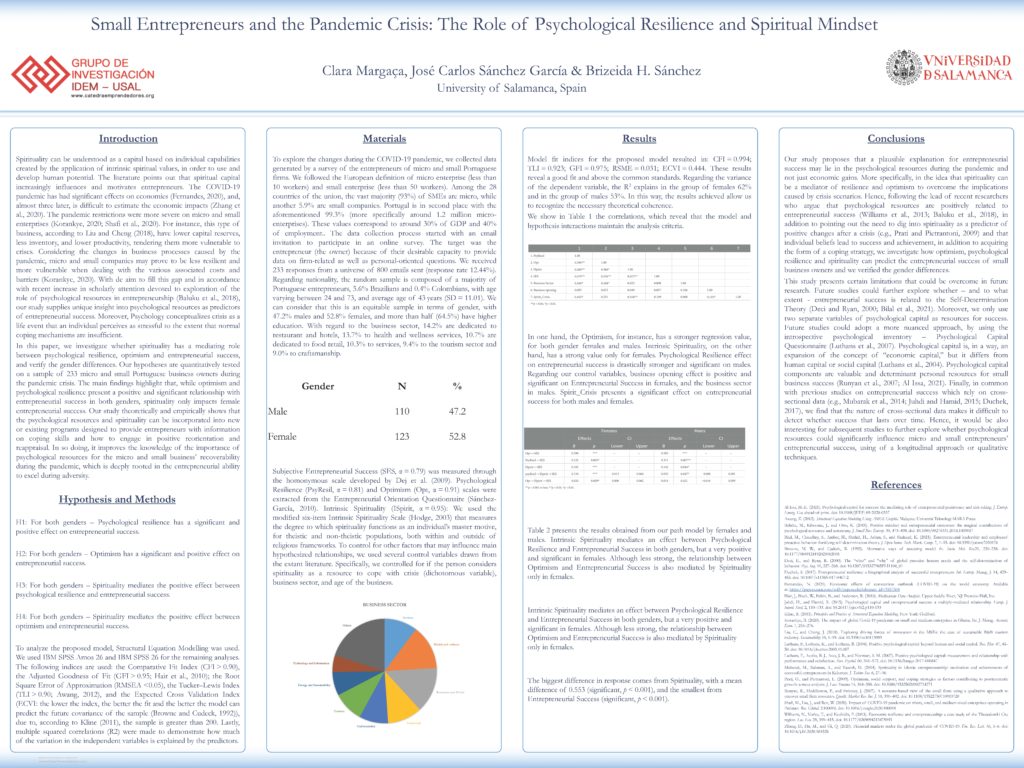Featured
Up-and-Coming Voices: Entrepreneurship and Leadership in Psychological Science

Small Entrepreneurs and the Pandemic Crisis: The Role of Psychological Resilience and Spiritual Mindset • Facilitators and Obstacles at the Lowest Rung in the Leadership Journey • The Association Between Leadership Styles, Trait Mindfulness, and Empathy
During the 2022 APS Annual Convention in Chicago last May, students and early- to mid-career researchers had the opportunity to share their research with the scientific community during several poster sessions. For this issue on entrepreneurship in psychological science, we asked three researchers to share their findings, the study’s contributions to the field, and their next steps regarding their research.
The 2023 APS Annual Convention will take place in Washington, D.C., on May 25–28, 2023.
Small Entrepreneurs and the Pandemic Crisis: The Role of Psychological Resilience and Spiritual Mindset
Research Proposal Poster
Clara Margaça, José Carlos Sánchez García, & Brizeida H. Sánchez (University of Salamanca)

What did the research reveal that you didn’t already know?
This research (now published in Frontiers in Psychology) underlined the importance of psychological resources, such as resilience, and the spiritual mindset of micro and small entrepreneurs in facing the COVID-19 pandemic. Our study revealed that a plausible explanation for entrepreneurial success may lie in the psychological resources during the pandemic and not just economic gains—more specifically, in the idea that spirituality can be a mediator of resilience and optimism to overcome the implications caused by crisis scenarios. In addition, this research revealed that for women entrepreneurs, spirituality had a strong and positive mediating effect between psychological resilience and the success of their entrepreneurial activity.
How might your findings contribute to the broader research on entrepreneurship and leadership in psychological science?
As a contribution to entrepreneurship and leadership in psychological science, this research showed that during a crisis (a pandemic, in particular) individual beliefs and resilience are crucial to entrepreneurial success. This study also revealed the need for future research that uses longitudinal approaches and qualitative techniques, assesses behavioral variations and personal beliefs that may influence the development of the local economy, and promotes an idiosyncratic perspective of the entrepreneur.
What are your next steps regarding this research?
This research brought promising findings to support further assessing the influence of these variables for a “spiritually informed economy.” We would like to extend the research to a particular population: immigrant-entrepreneurs. This group tries to survive in their “host society” and often finds in different capitals—psychological, cultural, spiritual, human, social—the necessary resources to strengthen entrepreneurial activity. In addition, we are also interested in comparing whether the results might change in different countries with different nationalities and cultural backgrounds (e.g., ethnic, religious affiliations).
Facilitators and Obstacles at the Lowest Rung in the Leadership Journey
Shubhra Prateek Gaur (MICA, Ahmedabad)
What did the research reveal that you didn’t already know?
An insight I did not expect was that although the conception of leadership and facilitators for career growth leadership for men and women were by and large the same, concerns or hindrances differed extensively. Both men and women gave importance to multitasking, perseverance, consistency, empathy, perceptiveness, flexibility, openness to learning, and effective communication skills as facilitators. However, obstacles to leadership that males reported were largely work related and people related, whereas females primarily expressed obstacles related to implicit social bias and personal factors like hypersensitivity, dependency, paranoia, procrastination, not being a team player, and introversion.
How might your findings contribute to the broader research on entrepreneurship and leadership in psychological science?
The findings have implications for a) future studies to probe into identifying ways to overcome perceived personal shortcomings in women; and b) creating training and development modules. These modules may include fostering leadership skills in women working in corporate management positions and enhancing self-efficacy for leadership.
Learn more about the 2023 APS Annual Convention Poster Awards.
What are your next steps regarding this research?
My next research project is focusing on whether these self-related hindrances are real or perceived and the strategies men and women use to overcome obstacles to further their career growth and leadership aspirations.
The Association Between Leadership Styles, Trait Mindfulness, and Empathy
Arina Malekanfard and Daniel Lim (Adelphi University)
What did the research reveal that you didn’t already know?
Our research aimed to explore the association between leadership styles, trait mindfulness, and empathy. The findings revealed a surprising lack of correlation between the laissez-faire leadership style and both trait mindfulness and empathy levels. Laissez-faire leadership style is an approach where the leader provides the team members minimal guidance and involvement and allows them to work completely independently. The absence of a correlation between laissez-faire leadership style and mindfulness and empathy is an intriguing discovery that highlights the need for further research in this area.
How might your findings contribute to the broader research on entrepreneurship and leadership in psychological science?
By examining the relationship between these variables, the research sheds light on the ways in which different leadership styles may influence the psychological well-being and effectiveness of leaders and entrepreneurs. The findings provide a foundation for the development of new models and theories that integrate these important psychological factors into our understanding of entrepreneurship and leadership. Ultimately, this research can help inform the development of leadership training programs and interventions that aim to enhance the effectiveness of leaders and entrepreneurs.
What are your next steps regarding this research?
The next steps in this research would involve investigating the underlying causes of mindfulness and the ability to take action with awareness. Future studies could examine the association between individuals’ characteristics and mindfulness levels. This will help to determine whether individuals with dominant characteristics have difficulty describing their feelings mindfully because of their characteristics or their dominant characteristics result from a lack of mindfulness. Additionally, future research could explore the relationship between dominant characteristics and the ability to take action mindfully, as this correlation was not examined in the current study. This research can provide a deeper understanding of the factors that influence mindfulness and how it relates to leadership and entrepreneurial outcomes.
Feedback on this article? Email apsobserver@psychologicalscience.org or login to comment. Interested in writing for us? Read our contributor guidelines.





APS regularly opens certain online articles for discussion on our website. Effective February 2021, you must be a logged-in APS member to post comments. By posting a comment, you agree to our Community Guidelines and the display of your profile information, including your name and affiliation. Any opinions, findings, conclusions, or recommendations present in article comments are those of the writers and do not necessarily reflect the views of APS or the article’s author. For more information, please see our Community Guidelines.
Please login with your APS account to comment.